高三英语复习情态动词
高考英语复习情态动词课件

在实际英语交流中多加练习,提高运用情态动词的能力。
情态动词的特点
情态动词有一些特殊的语法规则和用法,我们将在接下来的内容中进行详细介绍。
情态动词的形式
1 情态动词的基本形式
情态动词只有一种基本形式,不受人称和数的变化。
2 情态动词加“to”的形式
有时情态动词可以与“to”连用,构成不定式形式。
3 情态动词的否Biblioteka 与疑问形式情态动词的否定形式是在情态动词前加“not”,疑问形式是将情态动词调到句首。
练习题三
根据上下文,选择适当的情态动 词填入空白处:He ________ be at home. His car is parked outside.
总结与展望
复习情态动词
通过本课件的学习,我们对情态动词的概述、形式、用法和意义有了更深入的了解。
练习巩固
继续复习情态动词,做更多的练习题来巩固所学内容。
高考英语复习情态动词课 件
欢迎来到高考英语复习情态动词课件!通过本课件,我们将深入探讨情态动 词的概述、形式、用法、意义、句式,并提供练习题进行复习。让我们开始 吧!
情态动词的概述
什么是情态动词?
情态动词是一类能够表示说话人态度、能力、愿望、推测等的特殊动词。
常见的情态动词
常见的情态动词包括can、could、may、might、will、would、shall、should、must等。
情态动词的用法
表达能力和许可
情态动词可以用于表达能力、许 可及禁止的意义,以及提出请求 和给予建议。
表达推测和可能性
情态动词常用于表达推测、可能 性和推测过去的情况。
表达判断和义务
情态动词也可以用于表达判断、 义务和必要性,以及表示主观态 度和情感。
情态动词高中知识点高三

情态动词高中知识点高三情态动词是一类具有特殊意义和用法的动词,它们在句子中一般与实义动词连用,表示说话人的推测、命令、请求、建议等情态。
在高中英语学习中,掌握情态动词的正确用法至关重要。
本文将介绍情态动词的相关知识点,帮助高三学生更好地运用这一语法现象。
一、情态动词的定义情态动词,又称情态助动词,是用来表示说话人对某种动作或状态的态度、推测、可能性、能力、意愿、义务等情态的一类特殊动词。
常见的情态动词包括can、could、may、might、must、shall、should、will、would等。
二、情态动词的用法1. 表示能力情态动词can表示某人具有能力或可能做某事,could用于过去说法。
例如:- She can speak three languages fluently.(她能说流利的三种语言)- He could lift the heavy boxes when he was younger.(他年轻时能搬起这些沉重的箱子)2. 表示推测和可能性情态动词may、might、could用于表示推测和可能性。
may用于表示较为肯定的推测,might和could表示推测的可能性较小。
例如:- The weather is cloudy, it may rain later.(天气多云,可能会下雨)- He might be late for the meeting.(他可能会迟到会议)3. 表示义务和建议情态动词must表示说话人对某种行为具有强烈的责任感或坚决要求,should表示建议。
例如:- We must obey the laws of the country.(我们必须遵守国家的法律)- You should apologize to your friend for your mistake.(你应该为你的错误向朋友道歉)4. 表示许可和请求情态动词can、may、could用于表示允许和请求。
高考情态动词重点讲解
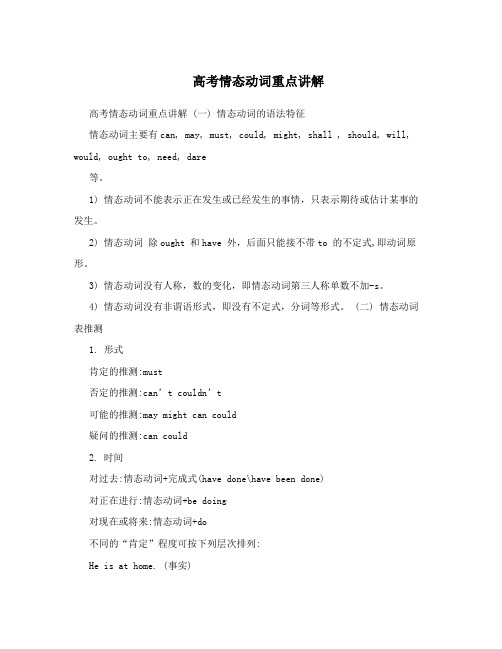
高考情态动词重点讲解高考情态动词重点讲解 (一) 情态动词的语法特征情态动词主要有can, may, must, could, might, shall , should, will, would, ought to, need, dare等。
1) 情态动词不能表示正在发生或已经发生的事情,只表示期待或估计某事的发生。
2) 情态动词除ought 和have 外,后面只能接不带to 的不定式,即动词原形。
3) 情态动词没有人称,数的变化,即情态动词第三人称单数不加-s。
4) 情态动词没有非谓语形式,即没有不定式,分词等形式。
(二) 情态动词表推测1. 形式肯定的推测:must否定的推测:can’t couldn’t可能的推测:may might can could疑问的推测:can could2. 时间对过去:情态动词+完成式(have done\have been done)对正在进行:情态动词+be doing对现在或将来:情态动词+do不同的“肯定”程度可按下列层次排列:He is at home. (事实)He must be at home.(非常肯定的推断)He could be at home.(很可能)He ought to be at home.(很可能)He may be at home.(仅仅可能而已)He might be at home.(或许, 非常不确定)He might not be at home.(也许不在家)He may not be at home. (比might可能)He couldn’t be at home.(很可能不在家)He can’t be at hom e.(一定不在家)He isn't at home.(事实)(三) 高考常用情态动词辨析1. can\ could\ be able to表示能力can和be able to都表示能力(Ability),意思上没多大区别。
高三英语新高考复习优秀PPT情态动词课件

【名校课堂】获奖PPT-高三英语新高 考复习 课件第 七章情 态动词 课件( 最新版 本)推 荐
Would you like me to carry it for you? 我帮你拿这个好吗?(委婉) Would you please not sing so loudly? 你能别唱这么大声吗?(委婉的否定)
【名校课堂】获奖PPT-高三英语新高 考复习 课件第 七章情 态动词 课件( 最新版 本)推 荐
【名校课堂】获奖PPT-高三英语新高 考复习 课件第 七章情 态动词 课件( 最新版 本)推 荐
疑问句中可用can/could(能) 表示推测。如: Could he have finished his task? 他能完成任务吗?
第七章 情态动词
知识梳理
一、概念及分类 1. 情态动词+动词原形 情态动词表示说话人对有关行为或事物的态度及看法, 认为其可能、 应该或必要等, 不能单独作谓语, 只能和其他动词原形一起作谓语。 2. 情态动词有四类 ①只作情态动词: must, can(could), may(might), ought to ②可作情态动词, 又可作实义动词: need, dare ③可作情态动词, 又可作助动词: shall(should), will(would)
【名校课堂】获奖PPT-高三英语新高 考复习 课件第 七章情 态动词 课件( 最新版 本)推 荐
【名校课堂】获奖PPT-高三英语新高 考复习 课件第 七章情 态动词 课件( 最新版 本)推 荐
(4)dare作为情态动词, 后面直接加动词原形, 无人称和数的变化, 不 受时态的影响。 主要用于疑问句、否定句及条件状语从句中。 如: Dare you go home alone? 你敢一个人回家吗? She dare not say what she thinks. 她不敢说出她的想法。 No one dare speak of it. 没有人敢谈这件事。
高考英语情态动词讲解
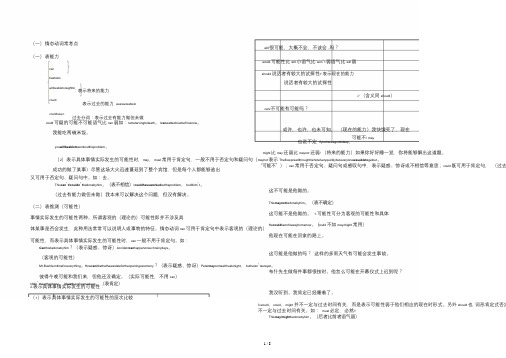
(一)情态动词常考点will很可能,大概不会,不该会,,吗?(一)表能力would可能性比will小语气比won’t弱语气比will弱canshould说话者有较大的试探性// 表示现在的能力beableto说话者有较大的试探性willbeableto oughtto:表示将来的能力// (含义同should)could表示过去的能力was/wereabletocan/不可能有可能吗?couldhave+过去分词:表示过去有能力做但未做could可疑的可能不可能语气比can弱如:Iamstarvingtodeath。
I can eattwobowlsofricenow。
或许,也许,也未可知,(现在的能力)我快饿死了,现在我能吃两碗米饭。
可能不/ may也说不定Ifyouhaveagoodsleep,you willbeableto workoutthisproblem。
might比may还弱比maynot还弱/ (将来的能力)如果你好好睡一觉,你将能够解出这道题。
(2)表示具体事情实际发生的可能性时,may,must常用于肯定句,一般不用于否定句和疑问句(maynot表示Thefirespreadthroughthehotelveryquicklybuteveryone wasableto getout。
“可能不”);can常用于否定句、疑问句或感叹句中,表示疑惑、惊讶或不相信等意思;could既可用于肯定句,(过去成功的做了某事)尽管这场大火迅速蔓延到了整个宾馆,但是每个人都能够逃出又可用于否定句、疑问句中。
如:去。
This can’t/couldn’t bedonebyhim。
(表不相信)I couldhaveworked outtheproblem,butIdidn’t。
这不可能是他做的。
(过去有能力做但未做)我本来可以解决这个问题,但没有解决。
This maynot bedonebyhim。
高考英语情态动词用法归纳
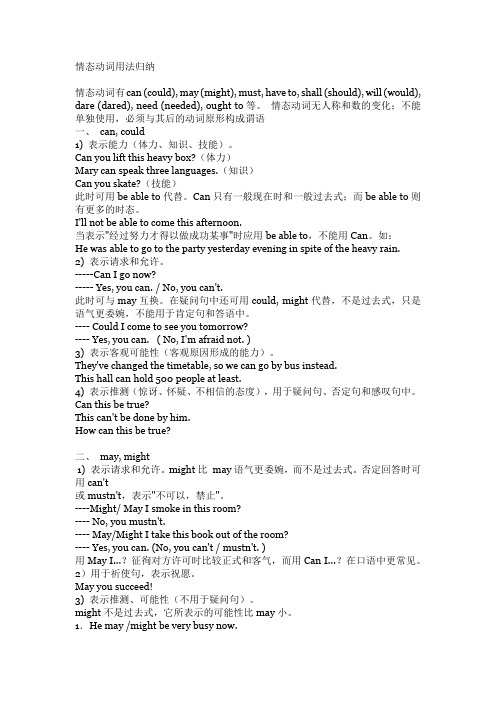
情态动词用法归纳情态动词有can (could), may (might), must, have to, shall (should), will (would), dare (dared), need (needed), ought to等。
情态动词无人称和数的变化;不能单独使用,必须与其后的动词原形构成谓语一、can, could1) 表示能力(体力、知识、技能)。
Can you lift this heavy box?(体力)Mary can speak three languages.(知识)Can you skate?(技能)此时可用be able to代替。
Can只有一般现在时和一般过去式;而be able to则有更多的时态。
I'll not be able to come this afternoon.当表示"经过努力才得以做成功某事"时应用be able to,不能用Can。
如:He was able to go to the party yesterday evening in spite of the heavy rain.2) 表示请求和允许。
-----Can I go now?----- Yes, you can. / No, you can't.此时可与may互换。
在疑问句中还可用could, might代替,不是过去式,只是语气更委婉,不能用于肯定句和答语中。
---- Could I come to see you tomorrow?---- Yes, you can. ( No, I'm afraid not. )3) 表示客观可能性(客观原因形成的能力)。
They've changed the timetable, so we can go by bus instead.This hall can hold 500 people at least.4) 表示推测(惊讶、怀疑、不相信的态度),用于疑问句、否定句和感叹句中。
高三英语 情态动词语法考点解析

高三英语情态动词语法考点解析高中英语怎么提高,其中很关键的一点就是学好英语语法。
很多英语完形填空解题技巧和英语阅读理解解题技巧都离不开英语语法。
语法是重要的考点,也是考试的难点,原因在于其内容之繁杂和零散。
整理了情态动词语法考点解析,很不错的高三英语语法重要复习资料哦!一、can和could1、can的用法(1)表示体力和脑力方面的能力。
(2)表示对现在的动作或状态进行主观的猜测,主要用在否定句和疑问句中。
(3)表示可能性,理论上的可能性,意为有时候可能会,可用于肯定句。
(4)表示允许,意思与may接近。
(5)表示说话人的推测、怀疑、惊异、猜测或不肯定等,主要用于否定句、疑问句或感叹句中。
(6)can的特殊句型cannottoo / enough表示无论怎么。
也不过分。
越。
越好。
cannot but+ do sth.表示不得不,只好。
2、could的用法(1)表示能力,指的是过去时间。
(2)表示允许,指的是过去时间。
(3)表示可能,可以指过去时间,也可以指现在时间,表示语气缓和。
(4)委婉客气地提出问题或陈述看法,指的是现在时间。
主要用于疑问句,回答时用can。
3、can与could的区别can表推测时只用于否定句和疑问句(could无此限制)。
couldn’t的可能性比can’t小。
4、can与be able to的区别(1)现在时:无区别,但后者不常用。
(2)完成时;can没有完成时,此时要用have(has,had)been able to。
(3)将来时:can没有将来时,要用will be able to。
(4)过去时:could表示一般能力,was/were able to 表示在具体场合通过努力成功做成某事的能力。
二、may 和might1、may的用法(1)表示询问或说明一件事可不可以做。
(2)表示一件事或许会发生或某种情况可能会存在,通常用在肯定句和否定句中。
人教版英语高三必修3 Unit1 情态动词的用法

知识点 must/have to/need/dare的用法
考点分析
1. must/have to 表示“必须”
(1)在否定回答时不能用 mustn't(禁止,不准),而用 needn't 或者 don't have
to(不必)。
(2)must 指说话人的主观看法,而 have to 强调客观需要。must 只有一般现
(2)用于虚拟语气表示“万一”或“竟然”。should have done sth.表示“本 应该做某事,但事实上却没有做”。
You should often help your mother with the housework. 你应该常帮你母 亲做家务。
He shall have the book when I finish reading. 当我读完这本书他就可以看了。
对点训练 用适当的情态动词填空 1. Each competitor ____s_ha_ll/_sh_o_ul_d _ch_oo_s_e _______________(choose) a number in the competition. 2. I planted a flower last year, but it ______w_o_ul_d _no_t _gr_ow______________(not grow) without enough sun.
I think the task can be completed in advance. 我想这项任务能提前完成。
高考英语考纲3500情态动词表

高考英语考纲3500情态动词表1. 什么是情态动词(Modal Verbs)?情态动词是表示说话人的意愿、能力、可能性等的助动词。
在高考英语考纲中,了解和正确运用情态动词是非常重要的。
2. 情态动词的用法以下是高考英语考纲中常用的情态动词及其用法:- Can(能)- 表示能力或许可:- eg. I can swim.(我会游泳。
)- eg. Can I borrow your pen?(我可以借用你的钢笔吗?)- Could (能、可以)- 表示过去或假设情况下的能力、请求或许可:- eg. I could swim when I was younger.(我小时候会游泳。
)- eg. Could you please be quiet?(你能不能请安静一点?)- May (可能、可以)- 表示可能性、许可或请求:- eg. It may rain tomorrow.(明天可能会下雨。
)- eg. May I go to the bathroom?(我可以去洗手间吗?)- Might(可能、也许)- 表示较低的可能性、请求或许可:- eg. It might snow tonight.(今晚可能会下雪。
)- eg. Might I use your phone?(我可以用一下你的手机吗?)- Must(必须)- 表示必须的义务、推测或许可:- eg. You must finish your homework.(你必须完成作业。
)- eg. It's late. You must go now.(太晚了,你必须走了。
)- Shall(将、会)- 表示将来或建议:- eg. Shall we go for a walk?(我们去散步好吗?)- Should(应该)- 表示应该、建议、责任等:- eg. You should study harder.(你应该更努力研究。
)- eg. I think you should apologize to her.(我认为你应该向她道歉。
(完整版)高考情态动词讲解

语法专题(三)情态动词考点归纳考点一:情态动词表示能力1.表现在的或一般的能力:表示现在的或一般的能力用can或be able to,can 比be able to 使用得更普遍。
can 侧重指有能力做某事;而be able to更强调通过努力、克服困难做成某事。
A computer can't think for itself ;it must be told what to do.He is a native speaker of English,so he can of course speak English quite well.2.表示将来的能力:表示将来能力用will be able to。
If you have a good sleep,you will be able to work out this problem.如果你睡个好觉,你就能做出这道题。
3.表示过去的能力:could 表示过去一般的能力,即不表示做或未做某事;而was (were) able to do则表示过去有能力并且成功地做了某事,相当于managed to do something/succeeded in doing somethin。
g考点二:情态动词表示推测(可能性)可能性可分为客观的(理论的)可能性和具体事情实际发生的可能性。
1.客观的(理论的)可能性指并不涉及具体某事是否会发生,此种用法常常可以说明人或事物的特征。
can 用于肯定句中表示客观的(理论的)可能性,can用于疑问及否定句中则表示实际发生的可能性。
The World Wide Web is sometimes jokingly called the World Wide Wait because it can be very slow.A left- luggage office is a place where bags can be left for a short time,especially in a railway station.2.表示具体事情实际发生的可能性:表示具体事情实际发生的可能性的这些词后接动词原形是对现在事情的推测,后接完成式则表示对过去事情的推测;其中can,may/might,should,ought to,must 有时还可接进行时表示对现在正在进行的事情的推测。
高中英语情态动词详细讲解及例句
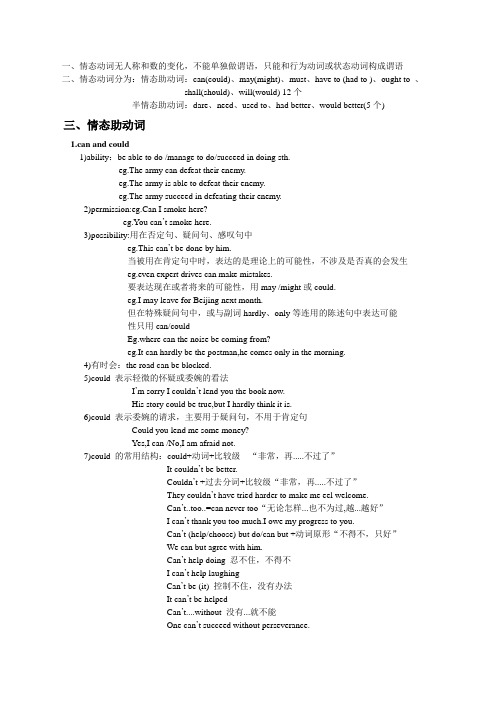
一、情态动词无人称和数的变化,不能单独做谓语,只能和行为动词或状态动词构成谓语二、情态动词分为:情态助动词:can(could)、may(might)、must、have to (had to )、ought to 、shall(should)、will(would) 12个半情态助动词:dare、need、used to、had better、would better(5个)三、情态助动词1.can and could1)ability:be able to do /manage to do/succeed in doing sth.eg.The army can defeat their enemy.eg.The army is able to defeat their enemy.eg.The army succeed in defeating their enemy.2)permission:eg.Can I smoke here?eg.You can’t smoke here.3)possibility:用在否定句、疑问句、感叹句中-eg.This can’t be done by him.当被用在肯定句中时,表达的是理论上的可能性,不涉及是否真的会发生eg.even expert drives can make mistakes.要表达现在或者将来的可能性,用may /might或could.eg.I may leave for Beijing next month.但在特殊疑问句中,或与副词hardly、only等连用的陈述句中表达可能性只用can/couldEg.where can the noise be coming from?eg.It can hardly be the postman,he comes only in the morning.4)有时会:the road can be blocked.5)could 表示轻微的怀疑或委婉的看法I’m sorry I couldn’t lend you the book now.His story could be true,but I hardly think it is.6)could 表示委婉的请求,主要用于疑问句,不用于肯定句Could you lend me some money?Yes,I can /No,I am afraid not.7)could 的常用结构:could+动词+比较级“非常,再.....不过了”It couldn’t be better.Couldn’t +过去分词+比较级“非常,再.....不过了”They couldn’t have tried harder to make me eel welcome.Can’t..too..=can never too“无论怎样...也不为过,越...越好”I can’t thank you too much.I owe my progress to you.Can’t (help/choose) but do/can but +动词原形“不得不,只好”We can but agree with him.Can’t help doing 忍不住,不得不I can’t help laughingCan’t be (it) 控制不住,没有办法It can’t be helpedCan’t....without 没有...就不能One can’t succeed without perseverance.2.may and might1)permission:May I use your pen?Yes,you may./No,you may not.2)Possibility:用于推测,表示不确定,不用于疑问句中She may know Tom’s address.出现I’m afraid.I’m not sure等表示不确定时,常用may/might.I’m afraid he might not come to attend the meeting today.从语气上判断,may表示的可能性比might 大,might更多的表示怀疑He may be very busy now.He might be very busy now.3)用于让步状语从句中However hard you may study,you cannot master English in a month.4)用于祈使句,表示祝愿May you succeed!5)might 常用于表示轻微的责备和委婉的请求You might post the letter for me if you are going near a post box.You might have let me know before!6)习惯用法:may as well do”理所当然,有足够的理由”She may be proud of her sonMay /might (just) as well do=had better do(最好)You might as well stay at home tonight.May/might as well+do A+as+do+B”与其做B不如做A”You might as well throw the money away as lend it to him.One may as well not know a thing at all as know it but imperfectly3.must and have to1)表示义务,一定要,必须You must arrive in good time.The meeting is very important.2)表示肯定性或难以避免,必然会,肯定会All men must die.3)must 表示有把握的推测,一定是,准时Must do/must be doing/must have doneThe tall fellow must be a basketball player.Let’s have something.You must be starving.He must have received mu letter which has mailed last week.4)must 表示非要,偏要,常以第二人称为主语,意指不耐或令人不愉快的事情,用于其他人称,表示主语固执,意为偏偏Why must you buy that car?Jane was never a pleasant young girl.After you gave her your advice,she must goand do the opposite.5)must 的三种否定形式表示不可能must be --can’t be must have done--can’t have doneYou must have met him before.You can’t have met him before.表示不必must do--need not to/don’t have toWe must get up at six tomorrow morning.We don’t have to get up at six tomorrow morning.表示决不能,严禁must--mustn’tYou mustn’t park your car here.6)回答以must提问的句子Must we clean all the rooms?Yes ,you must/No ,you don’t have to/No ,you needn’t7)must 可做名词,表示必须有的东西,必须做的事Warm clothes are a must in the mountains.8)must和have to 表示必须时,有一下差别Must 表示的是说话人主观的看法,而have to则往往强调客观需要The play is not interesting ,I really must go now.I have to work when I was your age.Must 一般只表现在,have to 则有更多的时态。
高三英语高考语法知识点归纳总结情态动词和虚拟语气 情态动词

will/would
请求、建议,would比will委婉客气。
Would you pass me the book?
表示意志、愿望和决心。
I will never do that again.
They asked us if we would do that again
Mary is in poor health. She can be ill at any times.
在否只能用can和may。所以can’t时用以代替mustn’t,语气比may更肯。中文可以翻译为不可能。
Michael______be a policeman, for he’s much too short.
couldn’t do
may
可以(问表示请求)
可能,或许(表推测)
祝愿(用于倒装)
may not do
May…do…?
Yes,…may.
No,…mustn’t/can’t.
might
might not do
Might…do…?
Yes,…might
No,…might not.
must
必须,该(表主观要求)
①—Could I call you by your first name?—Yes, you______
A.will B.couldC.mayD.might
②Johnny, you_____play with the knife, you_____hurt yourself.
A.won’t/can’tB.mustn’t/may
You shall fail if you don’t work harder.警告
高中英语语法之情态动词
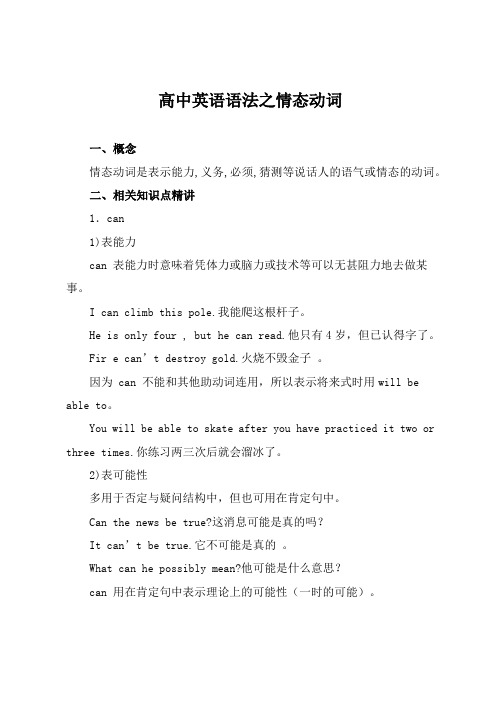
高中英语语法之情态动词一、概念情态动词是表示能力,义务,必须,猜测等说话人的语气或情态的动词。
二、相关知识点精讲1.can1)表能力can 表能力时意味着凭体力或脑力或技术等可以无甚阻力地去做某事。
I can climb this pole.我能爬这根杆子。
He is only four , but he can read.他只有4岁,但已认得字了。
Fir e can’t destroy gold.火烧不毁金子。
因为 can 不能和其他助动词连用,所以表示将来式时用will be able to。
You will be able to skate after you have practiced it two or three times.你练习两三次后就会溜冰了。
2)表可能性多用于否定与疑问结构中,但也可用在肯定句中。
Can the news be true?这消息可能是真的吗?It can’t be true.它不可能是真的。
What can he possibly mean?他可能是什么意思?can 用在肯定句中表示理论上的可能性(一时的可能)。
Attending the ball can be very exciting.The road can be blocked.这条路可能会不通的。
may 在肯定句中表示现实的可能性。
The road may be blocked.这条路可能不通了。
3)表示允许(和 may 意思相近)常见于口语。
Can (May) I come in ?我能进来吗?Can I smoke here ?我可以在这里抽烟吗?2.could 的用法1)表过去的可能和许可,(多用于间接引语中)At that time we thought the story could not be true.那时我们认为所说的事不可能是真的。
Father said I could swim in the river.爸爸说我可以在河里游泳。
高中英语2025届高考语法复习情态动词与虚拟语气知识讲解
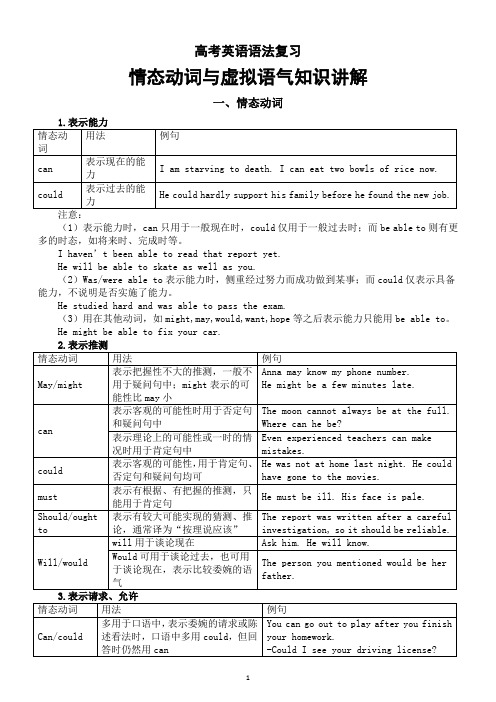
高考英语语法复习情态动词与虚拟语气知识讲解一、情态动词(1)表示能力时,can只用于一般现在时,could仅用于一般过去时;而be able to则有更多的时态,如将来时、完成时等。
I haven’t been able to read that report yet.He will be able to skate as well as you.(2)Was/were able to表示能力时,侧重经过努力而成功做到某事;而could仅表示具备能力,不说明是否实施了能力。
He studied hard and was able to pass the exam.(3)用在其他动词,如might,may,would,want,hope等之后表示能力只能用be able to。
He might be able to fix your car.(1)must还可以表示质问或感情色彩,意为“偏要,偏偏”。
Why must it snow on Saturday?(2)should还可以表示惊奇、愤怒、失望等特殊情感,尤其用在以why,who,how等开头的疑问句中或某些感叹句中。
why should you be so late today?(1)must作“必须”讲的一般疑问句,其肯定回答用must,否定回答用needn’t或don’t have to。
-Must I pay now?-Yes, you must./No, you needn’t.(2)need还可以作实义动词,有人称和数的变化,后跟带to的不定式作宾语。
She needed to go out for a walk.(1)两者在表示过去的习惯动作或行为时常可通用。
When we were children, we would/used to go skating every winter.(2)Used to与would都不能与表示具体频率、次数的词及特定的时间状语或具体的一段时间连用。
高三英语情态动词知识要点

高三英语情态动词知识要点高考英语情态动词要点如下:一、情态动词的基本用法1.must和have to两者都表示“必须”的意思,但是mu。
t含有说话入主观上的看法和态度,表示主观的义务和必要,主要用于肯定句和疑问句,意思为“必须,得,要,”;由muslsquo;引起的疑问句,肯定回答要用must或h。
ve to,否定回答要用needn’t或don’t have to,意思是“不必”;must的否定形式mustn’t表示禁止,意思是“不能,不许”;haveto则表示客观上的需要,意思是“不得不”.have to的否定形式是don’t have to,相当于needn,t。
①Mother out, so Ilook after the shop.妈妈不在家,因此我不得不照看商店。
②You~see the doctor,Joe You don,t lookvery well.乔,你必须去看医生,你看上去不是太好。
2.can和could(1)在日常会话中表示“许可,容许”时,常用can;当请求得到许可时,常用could,较为礼貌,而不用can。
①Yougo now.你现在可以走了。
②____I borrow your caf?我可以借你的车吗?(2)can用来表示有能力做某事;could多用于表示某人在某时期之内拥有的能力。
1____ swim when l was eight.(3)can用于询问某事是否可能,还通常用来表示某事是不可能的;could多用于疑问。
①That____be true 那不可能是真的。
②____ that really be true?那件事真的是那样吗?3.shall和shouldshall用于第二和第三人称的肯定句或否定句中表示说话人给予对方“禁止、命令、警告、允诺或威胁”等;用于第一和第三人称疑问句中时表示征求对方的意见。
should用来表示建议、责任和义务时,意为“应该、应当”,此时可用ought to替换;用于疑问句中时表示惊讶、忧虑和感叹等不满的情绪。
【高考英语】情态动词和虚拟语气(讲解)

语法专项情态动词一.情态动词的含义:情态动词只有情态意义,即表示说话人对动作的观点,如需要,可能,意愿或怀疑等。
情态动词主要有:can(could), may(might), must, shall(should), will(would), need, dare(dared), have to(had to),ought to, had better,would rather, used to等。
二.情态动词的特征:1.在形式上,情态动词没有实义动词的各种变化,只有could, would, had to, might, should等几个过去式。
其他如must, ought to等的过去式皆与现在式同形,且在各种人称后都用同样的形式。
2.在意义上,大多数情态动词有多个意义。
如can可表示“能够”,“可能”,“允许”等。
3.在用法上。
情态动词(除ought后接不定式外)与助动词一样,后接动词原形构成谓语动词。
三.情态动词的用法:(一)can/could的用法:1.表示能力:①表示现在的能力用can;表示过去的一般能力用could,若表示过去经过努力而做成某事,则用was/were able to do sth. 或managed to do sth. 或succeeded in doing sth.---Everyone here can speak English. (现在的能力)---A fire broke out in the hotel last night, but everyone was able to escape. (经过努力做成某事)②表示将来的能力常不用can,而用will be able to的将来时态:---I’ll be able to speak French in another few months.2.表示请求许可:若表示请求别人允许自己做某事,can/could均可,could表示委婉语气。
高考英语情态动词全解析

情态动词与高考一、情态动词情态动词是一种本身有一定的词义,用来表示说话人的情感、态度或语气的动词。
但不能单独作谓语,只能和其他动词原形构成谓语。
情态动词在高考中主要考查四点:情态动词表示推测和可能性的用法;情态动词与虚拟语气;情态动词的表达―情感、态度、语气等‖,情态动词表示―必要性‖等方面的用法。
二、情态动词的特点1.没有人称和数的变化。
2.有些情态动词有过去式的变化: e.g. will → would , can → could , may→ might , dare → dared三、情态动词的否定形式情态动词+ not +动词原形can not: can't , must not: mustn't , need not : needn't四、情态动词的用法及相互间的区别(注意:这是常考的考点)1. can , could could 是can的过去式, 表示过去有能力及过去存在的可能性; 有时用于疑问句表示委婉地提出问题。
–Could I use your bike ?--Yes,you can.(1). 表示体力或脑力方面的能力; can’t 不能,表示没能力(2). 表示允许,can’t 表示禁止,不允许(3)表示可能性,can, could表达推测时,一般用于疑问句和否定句中;can/could have done 可能做了某事1).You ______ be hungry already — you had lunch only two hours ago!A. wouldn’tB. can’tC. mustn’tD. needn’t2).She ______ have left school, for her bike is still here.A. can’tB. wouldn’tC. shouldn’tD. needn’t(4)can用于肯定句中表示一种理论上的可能性,并不牵涉是否真的会发生,在这种用法中can只能与动词原形连用,译成“有时候会”;could用于肯定句中,语气比may/ might更弱。
高三英语复习 情态动词讲义
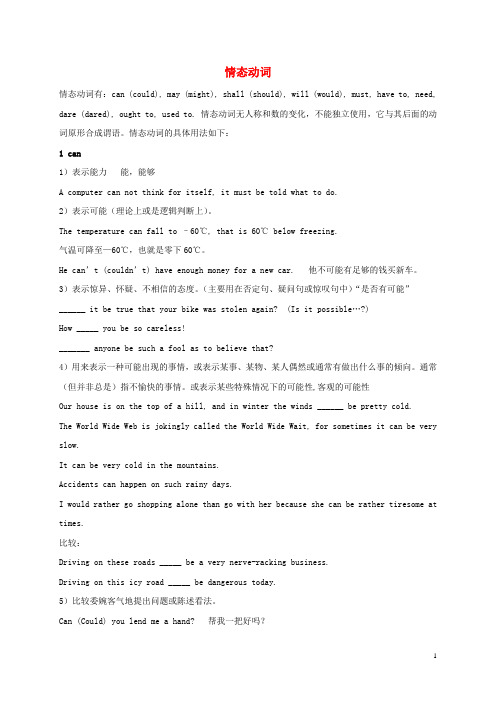
情态动词情态动词有:can (could), may (might), shall (should), will (would), must, have to, need, dare (dared), ought to, used to. 情态动词无人称和数的变化,不能独立使用,它与其后面的动词原形合成谓语。
情态动词的具体用法如下:1 can1)表示能力能,能够A computer can not think for itself, it must be told what to do.2)表示可能(理论上或是逻辑判断上)。
The temperature can fall to –60℃, that is 60℃ below freezing.气温可降至—60℃,也就是零下60℃。
He can’t (couldn’t) have enough money for a new car. 他不可能有足够的钱买新车。
3)表示惊异、怀疑、不相信的态度。
(主要用在否定句、疑问句或惊叹句中)“是否有可能”______ it be true that your bike was stolen again? (Is it possible…?)How _____ you be so careless!_______ anyone be such a fool as to believe that?4)用来表示一种可能出现的事情,或表示某事、某物、某人偶然或通常有做出什么事的倾向。
通常(但并非总是)指不愉快的事情。
或表示某些特殊情况下的可能性,客观的可能性Our house is on the top of a hill, and in winter the winds ______ be pretty cold.The World Wide Web is jokingly called the World Wide Wait, for sometimes it can be very slow.It can be very cold in the mountains.Accidents can happen on such rainy days.I would rather go shopping alone than go with her because she can be rather tiresome at times.比较:Driving on these roads _____ be a very nerve-racking business.Driving on this icy road _____ be dangerous today.5)比较委婉客气地提出问题或陈述看法。
高三英语高考语法复习系列课件:情态动词

A. can have
B. mustn’t have
C. can’t have
D. ought to not have
该句的意思为 Susan 不可能写出这样的报告来。ought to have done 的否定式为 ought not to have done。
5. Jack _C___ yet, otherwise he would have phoned me. (N 97) A. mustn’t have arrived B. shouldn’t have arrived C. can’t have arrived D. needn’t have arrived
2. I told Sally how to get here, but perhaps I ___C___ for her.
(N 1994)
A. had to write it out
B. must have written it out
C. should have written it out D. ought to write it out
A. needn’t B. wouldn’t C. mustn’t D. shouldn’t
此句的关键是“I’ve told him already”,由此可见,你 就不必再对他说了。
2. --- Could I call you by the first name? --- Yes, you_____C_____. (1998上海) A. will B. could C. may
2. There ___C______ be any difficulty about
passing the road test since you have practiced a lot
- 1、下载文档前请自行甄别文档内容的完整性,平台不提供额外的编辑、内容补充、找答案等附加服务。
- 2、"仅部分预览"的文档,不可在线预览部分如存在完整性等问题,可反馈申请退款(可完整预览的文档不适用该条件!)。
- 3、如文档侵犯您的权益,请联系客服反馈,我们会尽快为您处理(人工客服工作时间:9:00-18:30)。
2) 用于表示正确的数量或做某事的正确方法。 What do you mean, there are only ten tickets? There should be twelve. 你是什么意思?只有十张票?应该有二十张才对。 Every sentence should start with a capital letter. 每个句子都应该以大写字 母开头。 3) 表示某人对某事具有特定的感情或意见,意为“竟然”。 How sad that she should have no one to comfort her. 竟然没有人来安慰她, 真悲哀。 It’s hardly surprising that people should be suspicious of politicians’ promises. 人们对政治家的承诺表示怀疑,这一点都不让人吃惊。 8. will和would的用法。 Will可以表示意志,决心或愿望;表示经常性、习惯性的动作;有时也表示命 令;would也可表示愿望,还表示过去的习惯行为。 Surely we will support all the people in the world in their struggle for peace. 我们一定要支持全世界人民争取和平的斗争。 He will sit there hour after hour looking at the traffic go by. 他会经常一连 几个小时坐在那儿观看来往的车辆。 Accidents will happen. 意外总是难免的。
4) 表示某人不该或不可以作某事,常用在疑问句或否定句中。 You can’t expect the world to change overnight. 你不能指望世界一夜之间 就变样。 Jill’s left her husband, but can you blame her after the way he treated her? 吉尔离开了丈夫,但是他这样待她,你能责怪她吗? 2. could的用法 1) 表示过去的能力。 She could read Greek and Latin at the age of eight. 他八岁就会读希腊文和 拉丁文了。 In those days you could buy a box of cigars for a dollar. 那时候,一美元 可以买一盒雪茄。 I knew I couldn’t afford the rent. 我知道我付不起租金。 2) 表示请求或建议。 Could I have a drink of water, please? 我可以喝点水吗? I wonder if I could just ask you to sign this. 能否请您在这上面签名。 You could always try phoning her at the office. 你总可以打电话到她办公室 找她。 Maybe we could get together sometime next week? 下周的什么时候我们也 许可以聚聚?
Байду номын сангаас
2) 否定形式mustn’t,意为“禁止”。 You mustn’t talk to your mother like that. 你不应该那样和母亲说话。 We must never forget how much we owe to these brave men. 我们决不能 忘记要对这些勇士心存感激。 注意:must的否定形式有两种:当must表示“强制或义务”时,其否定意义 为“一定不要”,表示不许或禁止,将must do改为must not do;当 must表示“必须”时,其否定含义为“不必”,将must do改为need not do或don’t have to。 We mustn’t waste our time. 我们不应该浪费时间。 You need not/don’t have to get up at six tomorrow morning. 明天早上你不 必六点起床。 3) 作“偏要;硬要”解,用于第二人称时,表示不耐烦或令人不愉快的事情, 常用在if you must…中;用于其他人称,表示主语“固执”的意味。 If you must know, I’m going to help him look for an apartment. 如果你偏 要知道,我要帮他找一套公寓。 If I ask him to do something, he must do the opposite. 如果我让他做某件 事情,他偏做相反的事。 If you must if you must know must you…? (你非要?) why must you…? I must admit/say…
6. shall的用法 1) 表建议或征求意见,用于第一人称 Shall we say 6 o’clock, then? 那么,我们就定在六点钟好吗? How shall we manage while you are away? 在你离开期间,我们要怎样管理 呢? 2) 用于第二、三人称时表允诺,警告,命令,威胁等;在法律、条约、规章等 文件中,表示义务、规定。 You shall receive all the money that is owed to you. 你会拿回来欠你的所 有的钱。 All payments shall be made in cash. 所有款项都必须以现金支付。 7. should的用法 1) should表示“劝告、建议、义务、责任”,其同义词是ought to (否定式 ought not to do)。 We should/ought to go to class right away. 我们应该马上去上课。 We should (must) master a foreign language at least. 我们应当至少掌握一 门外语。 Children shouldn’t be allowed to play in the street. 不应该让儿童在街上玩。
一、情态动词的基本用法: 1. can的用法 1) 表示能力,意为“能;会”。 Even a small personal computer can store vast amounts of information. 即使是一台小型个人计算机也能储存大量的信息。 I’m afraid Mr. Harding can’t see you now—he’s busy. 抱歉,哈丁先生现在 不能见你,他正忙着呢。 The police are doing all they can to find her. 警方正在尽一切努力寻找她。 2) 表示请求或允许: Can you help me lift this box? 你能帮我抬起这个箱子吗? You can’t park her, it’s no parking zone. 你不能在这里停车,这里是非停车 区。 Any police officer can insist on seeing the driver’s license. 任何警察都可 以要求查看驾驶者的执照。 3) 与感官动词see, hear, feel, smell, taste及与思维有关的动词连用,表示 “看 到;听到”等。 Can you smell something burning? 你闻到什么东西烧焦了吗? I can’t understand why you’re so upset. 我不明白你为什么这么沮丧。 He can’t remember where he put the tickets. 他记不得把票放在哪儿了。
3. may的用法 1) 表示请求或允许,也可用在礼貌地说话、提问或提出建议。 There is a set of rules to show what members may and may not do. 有一 套规定写明会员可以做什么,不可以做什么。 You may sit down or stand, just as you wish. 你可以坐下也可以站着,随你 的便。 May I suggest that you consider the matter further before taking any action? 我可不可以建议你多考虑考虑再采取行动。 注意:当回答由may, can 引起的表示请求的句子时,否定答语用must not, can’t,表示“不许可;不应该;不行”,语气比较强烈。 —May/Can take the book out? 我可以把这本书带走吗? —Yes, you may/can. 可以。 —No, you may not. 不可以。(委婉) —No, you can’t/mustn’t. 不行。(强烈) 2) 意为“也许;可能”,用于表示虽然一种情况属实,但是另一种似乎很不同 的 情况也属实。 Although this may sound like a simple process, great care is needed. 虽 然这也许听上去像是一个简单的过程,但还是要非常小心。 Strange as it may seem, I always felt I belonged here. 尽管这好像很奇怪 但我总是觉得我属于这里。
Every employee will carry an identity card at all times. 每个员工都必须随 身携带身份证。 He would not let me try it. 他不肯让我去试。 When we worked in the same office, we would often have coffee together. 我们过去在同一办公室工作的时候,经常一起喝咖啡。 9. 用作情态动词的短语 cannot help but 不得不;can’t help doing人不住;can’t help it控制不住; cannot too无论怎样也不为过;may/might as well 最好;if you must… 如果你非要…… If you don’t like to swim, you may just as well stay at home. 如果你不喜欢 游泳,最好呆在家里。 I can not help but tell the truth. 我只好说出真相。
